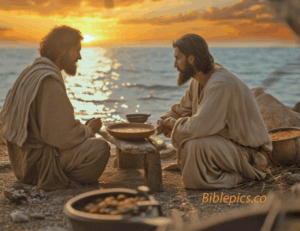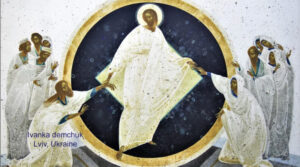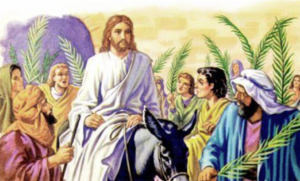Third Sunday in Ordinary Time Lectionary: 69
Who are the God-centered priests, government officials and people of today?
I usually read the Sunday Liturgical Year Readings in this order: Gospel, First Reading, Second Reading, Responsorial Psalm. My hunch is that this is the way the readings were chosen, the Gospel first, then the other readings chosen to help us see Jesus as the fulfillment of our Judeo-Christian salvation history.
OVERVIEW
This Sunday’s Gospel story, that of Jesus preaching in the Nazareth synogogue, was chosen by Luke to be the very first event in Jesus’ public life – the beginning of his formal ministry. The Church, in her wisdom, couples this Lucan account with the First Reading of priest Ezra and Nehemiah, governor of Judah, both living during the 5th Century BC period of Restoration that followed the Babylonian exile.
EZRA AND NEHEMIAH: ORDINARY PEOPLE THROUGH WHOM GOD WORKED EVERYDAY MIRACLES
Who are they but the two men who worked together on the formation of returning-from-exile Jews into a cohesive religious community, that is, reorienting them to a Jewish life as prescribed by the Torah (the first five books of our present day Bible), a way of life and traditions that was lost while they were in exile and forced to live commingled with non-Jews.
Ezra and Nehemiah and the returned people responded to God’s call. They were able to do that because Nehemiah, the governor, had the authority and Ezra, the priest, had acquired a knowledge and indepth understanding of the Jewish law of the Torah.
Ponder: Who are the God-centered priests, government officials and people of today? What is our part in working with them for the good of the local and global societies of our time? Who are the Ezra’s of today who know our Catholic faith well enough to guide us to becoming a more genuine Catholic Church of today? How often do you go to them, listen to and ponder their messages?
First Reading
Ezra the priest opened the scroll, all the people rose.
Ezra blessed the LORD and all the people, their hands raised high, answered, “Amen, amen!”
Then Ezra read plainly from the book of the law of God,
interpreting it so that all could understand what was read.
Then Nehemiah. . . said to all the people:
“Today is holy to the LORD your God.
Do not be sad, and do not weep.”
“Go, eat rich foods and drink sweet drinks,
and allot portions to those who had nothing prepared;
for today is holy to our LORD.
Do not be saddened,
for rejoicing in the LORD must be your strength!” Nehemiah 8:2-4a, 5-6, 8-10
BAPTIZED CHRISTIANS: FUNCTIONING MEMBERS OF THE ONE BODY OF CHRIST
In the Second Reading, we hear St. Paul, a God-centered Ezra of his time, informing the baptized Christians of Corinth that they may see themselves as individuals, but in their baptismal commitment they are truly one body, the Body of Christ, “drinking of the one Spirit.”
Ponder: Let us ponder Paul’s and Ezra’s messages to us, asking God to help us respond “Amen. Amen.” – and joining the Ezras, Nehemiahs and Pauls of today in keeping the Body of Christ whole by “drinking of the one Spirit.”
Second Reading
Brothers and sisters:
As a body is one though it has many parts,
and all the parts, though many, are one body,
so also Christ.
For in one Spirit we were all baptized into one body,
and we are all given to drink of one Spirit.
You are Christ’s body. 1 Corinthians 12:12-14, 27
NOW IS THE TIME OF FULL RESTORATION
In the Gospel passage we see Jesus making his first public statement, his inaugural address. And what does he say? After reading from the scroll of the prophet Isaiah, Jesus announces that the real time of Restoration is now.
Gospel
Jesus returned to Galilee in the power of the Spirit,
and news of him spread throughout the whole region.
. . . . He came to Nazareth, where he had grown up,
and went according to his custom
into the synagogue on the sabbath day.
He stood up to read and was handed a scroll of the prophet Isaiah.
He unrolled the scroll and found the passage where it was written:
The Spirit of the Lord is upon me,
because he has anointed me
to bring glad tidings to the poor.
He has sent me to proclaim liberty to captives
and recovery of sight to the blind,
to let the oppressed go free,
and to proclaim a year acceptable to the Lord.
Rolling up the scroll, . .
He said to all in the synagogue,
“Today this Scripture passage is fulfilled in your hearing.” Luke 4:14-21
Ponder: Who are the ones who, at the end of Jesus’ earthly ministry he commissions to be the Ezras, Nehemiahs and Pauls of our present time? It is His Disciples. Who are those faith-filled disciples, those members of the Body of Christ right now making us more of this one Body? Do we consider ourselves to be among them? More importantly, does God see us as doing all that we can to be among them? What am I doing now to become more integral by the “drinking of the one Spirit” that today “brings glad tidings to the poor, proclaims liberty to captives and recovery of sight to the blind, to let the oppressed go free, and to proclaim a year acceptable to the Lord”?
Did Jesus really mean to leave all this in our hands, in “my” hands? If or when I will be standing before God and giving an account of how I was an Ezra, a Nehemiah, a Paul, a disciple of Jesus, what am I going to say? What percentage of my adult life has been devoted to pursuing that to which God intends me to devote my life?
Sister Loretta
PS. Jesus said that “Now is a year acceptable to the Lord.” How can that be when things today are not what we expect is what God wants? (And they weren’t that way when Jesus was here.) So, maybe, as St. Paul says elsewhere, “For those who love God, all things work together unto good.” (Romans 8:28) Perhaps we need the trying events of the present so that we can grow into the more perfect individuals and become a more bonded Mystical Body of Christ.
Us, fully committing ourselves to that, – that would be “a year acceptable to the Lord.”





